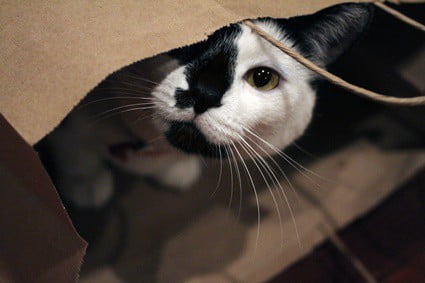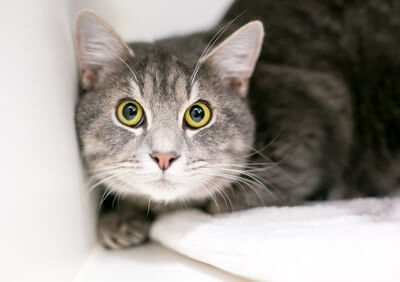Ma Theyre Being Weird Again Cat
If your cat is hiding or fleeing, then information technology'due south feeling unsettled. It's afraid that it'southward at chance of harm or even that its life is in danger. If your cat's demeanor has inverse suddenly, at that place's likely to exist a fear-based explanation.
If your cat is suddenly scared of everything, consider if anything has changed in its living surroundings. Disruption to its routine, such as moving furniture and unlike people, can make cats skittish. Loud noises, predatory animals, pets, sickness, and injury tin make cats experience more vulnerable.
Managing the needs of a scared cat requires a calm, relaxed owner. In fact, possessor anxiety will make a worried cat feel fifty-fifty more jittery. Y'all need to calm downwards your cat, only how you arroyo this depends on the cause.
Why Is My Cat Suddenly Frightened?
Cats like to project confidence and fearlessness, but this isn't e'er how they feel inside. Cats are skilled at hiding their fearfulness and trepidation as they don't like people to know that they feel agape or vulnerable.
If your cat has hurt itself, you may non know well-nigh it. Cats do all they tin to disguise signs of concrete injury. Your cat worries that injury is seen as a weakness, which could atomic number 82 to them losing territory or dominant status.
The same applies to affliction. Cats hide their hurting but will be frightened past ill health. For example, according to Hormones and Behavior, parasitic infections (roundworms, tapeworms, heartworm, hookworms, and whipworms) cause feet as cats don't understand what's incorrect with them.
The mistreatment of cats is a broad definition. Your cat may have been physically struck years agone. Unfortunately, certain scents and locations tin trigger memories of this past traumatic event.
Scolding a true cat for unwanted behaviors leads to anxious behavior. Anxiety and skittishness are likelier when punishment happens later on the action because cats don't link scolding to behavioral bug. Your true cat will become nervous, wondering if it will be punished over again.
What Makes Cats Feel Afraid?
Cats have an array of fears and phobias based on their instincts. Virtually are rational, but not all.
Common things that cats are agape of include:
- Loud noises
- Changes to routine or schedule
- Unfamiliar people or pets in the dwelling
- Wide-open spaces
- Predatory animals
- Visiting the vet
- Separation from an owner
- Traveling past car
Whatsoever of these issues can trigger a frightened response in a true cat.
Anxiety takes its cost on cats. As per Applied Animal Behavior Scientific discipline, stressed cats have much higher cortisol levels. Cortisol is colloquially referred to as the stress hormone. This explains why your true cat is feeling on edge.
What are the Most Mutual Scared True cat Behaviors?
The signs of a frightened cat include:
- Hiding
- Freezing on the spot
- Eliminating outside its litter box
- Scenting from the anal glands
- Uncharacteristic aggression
- Frantic grooming to self-soothe
- Constant vocalization
- Refusal to swallow, or eating to excess
- Clinginess
- Pacing around
All cats will display these behaviors occasionally, simply your cat shouldn't be constantly frightened and skittish.
Helping a Cat to Cope with Modify
Cats are creatures of habit, so changes to their routine cause significant anxiety. If your true cat doesn't experience secure, it'll feel increasingly nervous.
The near significant changes a cat can undergo are:
- A new living surround
- Getting a new pet
- Arrival of a new person or babe
A cat will notice if its owner is missing for longer than normal. Likewise, cats feel bereavement if a person or beast companion dies.
Living in a New Home
Moving home is overwhelming for cats because everything they know has changed. This means that a cat needs to learn everything all over again.
This is where a cat's fear of open space comes to the fore. Until you unpack, the house will be bare. Your true cat has lost all preferred hiding places. It needs to learn the new lay of the country and volition be nervous until this happens.
Focus on providing your cat with some hiding spaces. Every time y'all unpack a box, exit the box on its side. Space these boxes around your new home, and your cat will feel more safety and secure.
Unpack familiar items for your cat. Article of furniture that carries your cat's smell volition have a calming effect. Ensure your true cat has familiar toys and trees.
Adhere to your cat's former routine and provide enough of one-on-1 attention. Feed your cat when it would wait to be fed.
Adjusting to a New Pet
The arrival of a new pet tin can deeply unsettle your cat. Cats are territorial past nature, and sharing a abode with a potential rival could cause anxiety. Too, a new animal may bang-up an existing incumbent.
When introducing a new cat to your home, take the process slowly. Keep the new cat locked in a room until accepted by your existing pet. Introduce the two cats through a gate then that they can acquire each other'southward scents.
Feed the cats in divide locations. Provide each animal with its own food bowls, water supply, litter boxes, toys, and bed. Play with your cat and provide 1-on-one attention.

New Dwelling Resident
Cats abound used to the humans that share their dwelling house. When a new resident arrives, a true cat volition be perturbed. Babies will crusade item consternation.
Babies are loud and demand attention that used to get the cat. Your cat will go song and clingy, agape that it has been replaced. The true cat is imitating the beliefs of the baby.
Friends and partners can likewise affright cats. New people bring new scents, sounds, and behaviors. The cat will be initially afraid of this new person.
In one case the cat starts marking the man, bonding can begin. Cats recognize humans past voice, not sight. The more a cat hears a new man speak, the sooner it will start to overcome its fearfulness.
Noisy Environments
Cats have good hearing. Loud noises, especially brusk and abrupt sounds, are stressful to cats. These unsettling background noises include:
- Car horns
- Garbage trucks
- Emergency vehicle sirens
- Fireworks
- Household appliances, such every bit vacuum cleaners
- Thunder and lightning
- Doorbells
- Home improvements
- Street works
Fright of Predators
As the Periodical of Animal Environmental explains, the animal kingdom is divided into 3 tiers. These are casualty, mesopredators, and superpredators. Cats are mesopredators. This ways they are the hunters and the hunted.
Your cat may have encountered a predator in your yard. This volition provoke significant, prolonged fearfulness. Cats are driven by instinct and are always on the lookout for threats.
Wild animals that prey on cats include:
- Coyotes
- Snakes
- Birds of Casualty
- Cougars
- Raccoons
- opossums
- Bobcats
- Skunks
- Foxes
If your cat has become nervous, keep it indoors, particularly at night. Over fourth dimension, your cat volition calm down and experience secure again. Until this happens, provide reassurance and a rubber environment.
Separation Anxiety in Cats
If you lot leave your cat alone for a prolonged period of time, it may develop separation anxiety. The cat will be clingy and nervous when yous return. Your true cat is worried that you may exit once more.
You lot will need to rebuild your cat's trust and show your true cat that y'all will not abandon it. You may take to help your cat realize that you e'er return home after a period of absence.
Expose your true cat to a brusque fourth dimension apart from y'all. When y'all return, offer your cat food so that it starts to run across your return equally a positive. Your cat will not fright your departure and look frontward to your return.
Fear of the Nighttime
Despite often sleeping through the twenty-four hours, cats are not nocturnal. Felines are crepuscular. Crepuscular animals are nigh energetic at dawn and sunset.
Many domestic cats relish the darkness. Your cat's night vision is not perfect, only it's superior to that of humans. Domestic cats employ the stillness of the night to explore and hunt. If your cat has developed a sudden fear of the dark, there are 3 explanations:
- The cat experienced a frightening experience at dark
- The true cat is fearful that you lot volition non answer to its wishes at dark
- The true cat has developed cognitive dysfunction syndrome
If your cat ventures outside at nighttime, it may take encountered a predator. The cat is agape of reliving this experience. Keep your cat indoors at night. Play and feed information technology belatedly in the evenings so that it'due south more inclined to sleep.
Cats know that, while you are asleep, you lot will not provide attention. Your cat may be nervous and experience that it has non spent enough time with you. You may have forgotten an important activeness.
Cognitive dysfunction syndrome impacts senior cats, typically older than 15 years. Every bit explained past Veterinary Clinics, the symptoms include feet and clinginess, especially during the small hours of the morn.
Cats with cognitive dysfunction syndrome feel a reversed sleep-waking cycle. This makes the senior cat anxious and vocal at night. Your cat volition become distressed at being parted from you while yous're asleep.

What Can Be Done Most My Cat's Fretfulness and Anxiety?
If you have attempted lifestyle changes to no avail, then your true cat may have a generalized anxiety disorder. This is an illness caused by a chemical imbalance in the brain.
A vet tin can prescribe anti-anxiety medication, merely cognitive-behavioral therapy may be recommended before going down this path. Many vets consider exposure therapy to be an effective treatment for feline phobias.
Exposure Therapy
Exposure therapy involves turning a negative feel into a positive experience. Betrayal your true cat to whatever makes it nervous before offering play, petting, and grooming.
When the cat starts to calm downwardly, offer information technology a care for. Your cat may start to look forrad to something that previously provoked a fear response. If non, it will at least begin to become more tolerable.
Daily Management
An effective way to bargain with a true cat with generalized anxiety is to pretend it is invisible. Go well-nigh your daily routine every bit normal, and avoid unnecessary loud noises or routine changes.
Maintain your cat's medication if information technology has a prescription. Continue to work on overcoming your true cat'due south fears. The following volition start to at-home your true cat:
- Light scented candles, such equally lavender or frankincense
- Play feline-advisable music
- Requite the cat more space
- Practise not handle the true cat likewise much
- Provide hiding places
Use of natural herbs to calm downwardly an anxious cat. If the true cat shows no negative reaction, gradually increase exposure. Suitable herbs include:
- Catnip
- Chamomile, such as dried flowers or tea
- Hops
- Valerian
Given time, many cats do begin to at-home down. A cat with a generalized anxiety disorder may always exist nervous, and such cats just demand a peaceful living environment, amore, security, and understanding.
Source: https://www.seniorcatwellness.com/cat-scared-of-everything-suddenly/
0 Response to "Ma Theyre Being Weird Again Cat"
Post a Comment